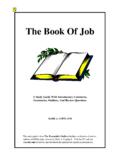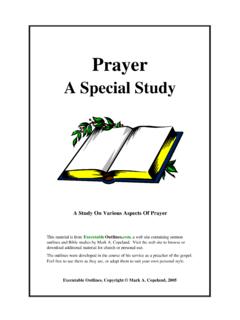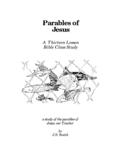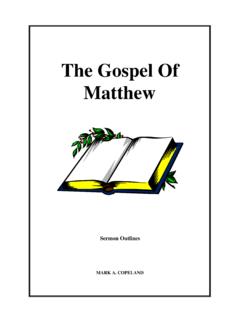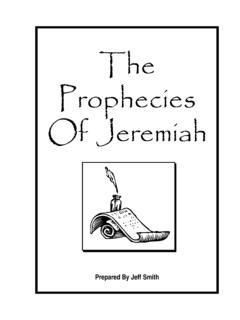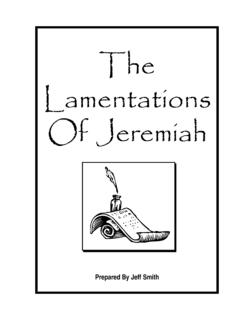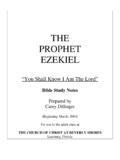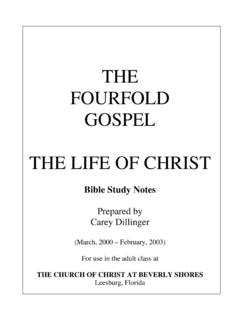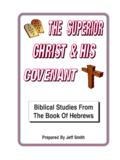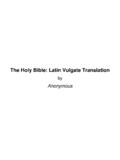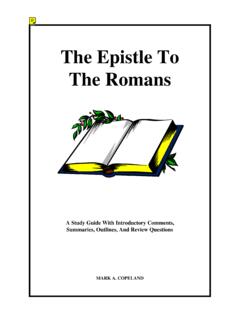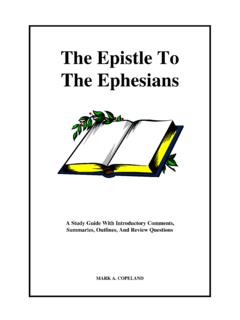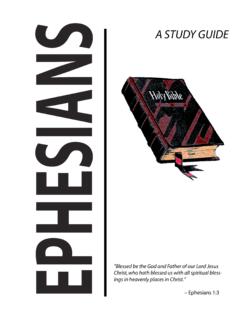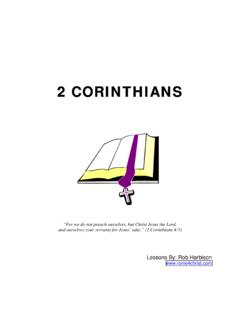Transcription of 1 Corinthians - Bible Study Guide
1 1 CORINTHIANS1 CORINTHIANS1 CORINTHIANS1 Corinthians Now I plead with you brethren, by the name of our Lord Jesus Christ, that you all speak the same thing, and that there be no divisions among you, but that you be perfectly joined together in the same mind and in the same judgment. (1 Corinthians 1:10) Lessons By: Rob Harbison 1 Corinthians 1 Lessons by Rob Harbison TABLE OF CONTENTSTABLE OF CONTENTSTABLE OF CONTENTSTABLE OF CONTENTS Topic Page Table of Contents 1 Introduction 2 Chapter 1:1-17 5 Chapter 1:18-31 7 Chapter 2:1-16 9 Chapter 3:1-17 12 Chapter 3:18-4:21 15 Chapter 5:1-13 18 Chapter 6:1-11 20 Chapter 6:12-20 22 Chapter 7:1-16 24 Chapter 7:17-40 27 Chapter 8:1-13 29 Chapter 9:1-14 31 Chapter 9:15-27 33 Chapter 10:1-13 35 Chapter 10:14-11:1 37 Chapter 11:2-16 39 Chapter 11:17-34 41 Chapter 12:1-11 43 Chapter 12:12-31 45 Chapter 13:1-13 47 Chapter 14:1-19 49 Chapter 14:20-40 51 Chapter 15:1-28 54 Chapter 15.
2 29-58 57 Chapter 16:1-24 59 1 Corinthians 2 Lessons by Rob Harbison INTRODUCTIONINTRODUCTIONINTRODUCTIONINTR ODUCTION Lesson 1 AUTHOR Paul (1:1; 16:21) DATE ca. 54-55 AD PLACE Written from Ephesus (16:8). Paul was near the close of a very effective 3-year ministry in Ephesus when he wrote this book (see Acts 19:1,8,10; 20:31). Even though successful in Ephesus, his continual concern was for all the churches daily (2 Corinthians 11:28). BACKGROUND The City Of Corinth. During Paul s time, Corinth was the most important city of Greece, probably the fourth largest city in the Roman Empire, according to Erdman. Athens was a greater center of culture, religion and philosophy, with the goddess Athena, the goddess of the mind, overshadowing the city (Acts 17:16-34). Whereas, Corinth was a greater center of greed, lust, and debauchery with the goddess Aphrodite, goddess of the body underlying the corruption of the city (1 Corinthians 5:9-13; 6:9-11).
3 Farrar says it was ..a city conspicuous for its depravity even amid the depraved cities of a dying heathenism. Gettys describes it as a seaman s paradise, a drunkard s heaven, and a virtuous woman s hell. Barclay says Corinth was a by-word for evil and immoral living. The very word korinthiazesthai (to live like a Corinthian), has become a part of the Greek language; and it meant to live with drunken and immoral Corinth was world-renowned for the temple of Aphrodite, which sat on the hill of the Acropolis, with her 1000 priestesses, who were nothing more than temple prostitutes. Yet, it was this ungodly city wherein God told Paul I have many people in this city (Acts 18:9-11). History Of Church In Corinth. Established at the end of Paul s second missionary journey, about 50AD, the church was a mixture of Gentiles (Acts 18:7) and Jews (Acts 18:2,8,17) from the very beginning.
4 Silas and Timothy joined Paul shortly after his arrival. After his conversion, Apollos preached and built up the church in Paul s absence (Acts 18:24-19:1). He evidently converted many of them (cf. 1 Corinthians 1:12; 3:4-6,22; 4:6). There is also the possibility that Peter ministered to the Corinthians (1 Corinthians 1:12; 9:5), although his name may only be used to illustrate Paul s point regarding partyism (cf. 1 Corinthians 4:6). Reconstruction Of Events And Dates. The following is taken from Survey Of First Corinthians , by Jimmy Allen, pp. 19-20. Paul mentions two additional epistles he wrote to the Corinthians which we do not have recorded. 50-52AD Paul s first visit to Corinth. He remained for eighteen months. 52AD Apollos went to Corinth from Ephesus (Acts 19:1). 53AD Paul, from Ephesus, wrote Corinthians A which dealt with the matter of refusing fellowship to Christians involved in sexual immorality (1 Corinthians 5:9).
5 54AD Paul received a report from Chloe s house concerning division in the Corinthian church. He also received a letter from Corinth asking a number of questions. 54-55AD From Ephesus, Paul wrote Corinthians B ( 1 Corinthians ) in response to the report and letter he had received from Corinth. 54-55AD Paul then sent Timothy and Erastus into Macedonia (Acts 19:22). He intended to follow them (Acts 19:21; 1 Corinthians 16:5-6), however, it seems that his plan was not carried out since he stayed in Asia for a while (Acts 19:22). 1 Corinthians 3 Lessons by Rob Harbison 54-55AD Paul learned of trouble in Corinth and crossed the Aegean Sea to deal with it. He then returned to Ephesus. 54-55AD When back in Ephesus, Paul wrote the severe letter or Corinthians C to the church at Corinth (2 Corinthians 2:3-4). 55AD Either the severe letter was carried by Titus or Paul sent him later to learn how the brethren had received it (2 Corinthians 2:12-13; 7:6-8).
6 Apparently, Titus made his journey across the Aegean Sea to Corinth and was to return by land to meet Paul at Troas (2 Corinthians 2:12). This is implied from the fact that Paul, not finding Titus at Troas, went into Macedonia. 55-56AD Paul left Troas and went into Macedonia where he met Titus who comforted him with a favorable report about how the Corinthians had responded to his severe letter (2 Corinthians 7:5-7). 55-56AD Paul was united with Timothy in Macedonia (Acts 19:22; 2 Corinthians 1:1). 55-56AD Paul wrote Corinthians D ( 2 Corinthians ) in Macedonia (2 Corinthians 2:12-13; 7:5). 55-56AD Paul made his third visit to Corinth (Acts 20:1-3; 2 Corinthians 12:14). CLUES Mentions Division. He had received a report of divisions among them (1:11). Division was inconsistent with their profession of Christianity (1:12-13). Such divisions showed their carnality and spiritual immaturity (3:1-4).
7 Division manifested itself in many different problems outlined in this epistle . These divisions ultimately showed who was approved among them (11:18-19). God intended that there should be peace and cooperation within the body rather than division (12:25). Such confusion and disorder did not originate with God (14:33,40). Answers Questions. The church posed a number of questions which Paul answered in this epistle . The letter which he received from them contained questions concerning marriage (7:1ff), virgins (7:25ff), things offered to idols (8:1ff), spiritual gifts (12:1ff), and the collection for the saints (16:1ff). This letter was probably delivered to Paul by Stephanas, Fortunatus, and Achaicus (16:17-18). SUMMARY Paul begins this epistle with reasons why they should not be divided (1 Corinthians 1-4), then follows with various ways which they show themselves to be divided (1 Corinthians 5-15).
8 Some see little unity within the book; they see it as a hodge-podge of unrelated subjects, but every New Testament epistle has an underlying thread which runs through every chapter, and ties them all together. Erdman may have identified it when he says In the nine verses which open the first chapter of the epistle , Paul dwells on the relation of the believer to Christ; and it is this vital relation which gives unity to the epistle , the contents of which may be thus summarized:Union with Christ is dishonored by factions (chs. 1 to 4); destroyed by impurity (chs. 5; 6); hallowed and illustrated by marriage (ch. 7); profaned by fellowship with idolatry (chs. 8 to 10); symbolized by the Lord s Supper (ch. 11); disgraced by disorder (chs. 12-14); consummated at the resurrection (ch. 15) (The First epistle of Paul to the Corinthians , ). OUTLINE I. Introduction (1:1-9) II.
9 Report Of Divisions Among Them (1:10-4:21) A. Christ Is Not Divided (1:10-17) B. Wisdom Of God And Wisdom Of Men (1:18-31) C. Wisdom Of Following God (2) D. Folly Of Following Man (3) E. Fools For Christ s Sake (4) 1 Corinthians 4 Lessons by Rob Harbison III. Report Of Immorality Among Them (5:1-6:20) A. Immorality Defiles The Church (5) B. Lawsuits Shame The Church (6:1-11) C. Immorality Corrupts The Christian (6:12-20) IV. Replies To Their Questions (7:1-16:4) A. Concerning Marriage (7) B. Concerning Things Offered To Idols (8:1-11:1) 1. Liberty Requires Sensitivity To Others (8) 2. Paul Also Denied His Own Personal Liberties (9) 3. Idolatry Can Destroy God s People (10:1-13) 4. Flee From Associations With Idolatry (10:14-22) 5. Give No Offense Whatever You Do (10:23-11:1) C. Concerning Public Worship (11:2-14:40) 1.
10 Head Covering (11:2-16) 2. The Lord s Supper (11:17-34) 3. The Use Of Spiritual Gifts (12-14) a. Unity In Individual Diversity Of Spiritual Gifts (12:1-31) b. The Greater Gift Of Love That Abides (13:1-13) c. The Proper Use Of Spiritual Gifts In Public Worship (14:1-40) D. Concerning Resurrection From The Dead (15) 1. Message Of The Gospel (15:1-19) 2. Victory Over Death In Christ (15:20-58) E. Concerning Collection For The Saints (16:1-4) V. Closing Remarks And Greetings (16:5-24) QUESTIONS 1) After reading 1 Corinthians in one setting, what repeated words or phrases did you observe? 2) What do these words and phrases tell you about the message of the book? 3) Did you see any pattern developing as the book unfolded? What pattern(s) did you see, if any? 4) List some of the reasons Paul insists that these brethren should not be divided (chapters 1-4).
